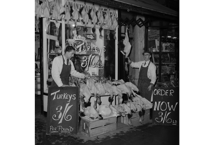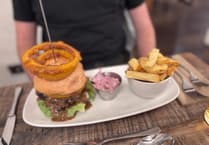During October I have been to the UK for three short visits for music.
I really like the Liverpool Philharmonic, Birmingham Town Hall and Symphony Hall, and the Bridgewater Hall in Manchester.
This time I saw Graham Nash - ex-Hollies and Crosby, Stills, Nash & Young - and he is still in good voice.
The audience is generally about my age, and again I was a little uncertain when he did the Stephen Stills number from 1970, ‘Love the One You’re With’, about him inviting such an audience to enthusiastically join in with the chorus!
Suzanne Vega was fantastic again on her latest tour, with hits such as ‘Marlene on the Wall’ (1985), ‘Left of Centre’ (1986), ‘Luka’ (1987), and ‘Tom’s Diner’ (1991).
I saw Justin Hayward, ex-Moody Blues frontman, at Birmingham. Sadly, with the death of John Lodge recently, he is the last surviving member, and he covered a number of great songs from their back catalogue together with the lovely songs from his collaboration with John Lodge, including ‘Blue Guitar’ and ‘Forever Autumn’, which featured in Jeff Wayne’s musical version of ‘War of the Worlds’.
He was supported by fantastic musicians who covered a great version of ‘Nights in White Satin’. Did you know that this record sold two million copies and charted three times in the UK - 1967, 1972 and 1979?
Finally, I went to see Lulu with her latest tour ‘If Only You Knew’ and wasn’t sure what to expect, but she didn’t disappoint.
I find it hard to believe she is 77, and her voice and enthusiasm are as sparkling as ever. She was interviewed by Kate Garraway, and their conversations and stories shared were revealing and honest.
I went to the soundcheck and met Lulu, whose eyes lit up when I said I was from the Isle of Man.
She was, of course, once married to Maurice Gibb of Bee Gees fame. I told Lulu that, having done discos since the mid-1970s, I always feature ‘Shout’, which fills the dance floor - and she said thank you. No, Lulu - it’s thank you!
--------------------------------------
It is always nice to hear from readers far and wide.
I recently had an email from Adrian McDowell, who now lives in Scotland but has happy memories of many holidays in the Isle of Man.
He said: ‘I remember Karma, “the lightning hypnotist”, at the Royalty Theatre.
‘When he came out on stage there was an atmosphere of trepidation.
‘I was scared of catching his eyes. I remember what he said as he looked around the expectant audience… “Why are you all looking so anxious? Nothing is going to happen to you… yet!”’
Adrian continued: ‘When I was 13 in 1954, I remember seeing a young Ken Dodd starting out at the Gaiety. I think Roy Castle was also on the bill. My late dad said: “Son, Ken Dodd is going to go far!”’
Did you ever see the Ken Dodd show? I saw it at the Gaiety, and luckily I took my sleeping bag with me!
Seriously though, he always enjoyed giving a real ‘value for money’ show and would always finish with his hit song ‘Happiness’. We could do with a bit more happiness and positivity right now, couldn’t we?
Back to Adrian’s comments to me: ‘I remember popping into a bar to hear the late, great Ken Mackintosh playing with a small group - a far cry from when he headed up a top orchestra. Susan Maughan was playing at the Crescent.’
I remember, Adrian, I saw her show and Freddy and the Dreamers myself! ‘Bobby’s Girl’ was number three in the charts at Christmas 1962, and she went on to appear in the 1963 Royal Variety Performance.
She is still with us, aged 87 - where does the time go?
Adrian told me: ‘One morning we were playing crazy golf at the Derby Castle and, hearing laughter, looked up to see Freddy and the Dreamers having a game!’
Once again, my own memory of Freddy and the Dreamers was of him flying on stage from the side on a rope and, of course, his energetic performance.
He was frontman of the band from Manchester until his retirement in 2001, but the band was most active in the early and mid-1960s.
He passed away in 2006, aged only 69. Before finding fame, Freddy worked as a milkman. The band had four top 10 UK hits including If You Gotta Make a Fool of Somebody, I’m Telling You Now, and You Were Made for Me.
Another memory that many of us will share with Adrian was the delicious smell of doughnuts in Strand Street and the sweet smell and big window where you could watch the confectioners at Gore’s Rock Shop hard at work, satisfying the need for gifts for happy holidaymakers.
Finally, his fondness for the Steam Packet boats that ferried the crowds to our island, including Manxman, Manx Maid, Lady of Mann and Ben-my-Chree. Adrian said Captain Jack Ronan invited them to the bridge of the Ben - ‘a lovely man!’
Thanks for getting in touch. --------------------------------------
The Isle of Man does not have a written constitution; rather, it is uncodified, similar to that of the UK, on which it is largely based.
We are a self-governing Crown Dependency - not part of the UK but under the sovereignty of the British Crown.
Our constitutional structure is based upon a combination of ancient laws and customs, Acts of Tynwald, UK Acts of Parliament that extend to the Isle of Man, and Royal Charters and Letters Patent from the Crown.
There have been Constitution Acts of Tynwald which set out the structure of government and the powers of Tynwald from 1961, 1971, 1990 and 2006. The Council of Ministers Act 1990 established the modern executive branch, and election acts regulate the democratic process.
Certain UK statutes apply, either directly or by extension - especially in relation to international relations and defence, nationality and immigration, and certain aspects of constitutional law.
It would make no sense for the Isle of Man to have an army or foreign consular representation, both of which are covered for a payment to the UK.
Certain unwritten conventions exist.
The Lieutenant Governor, for example, acts on the advice of the Council of Ministers in domestic affairs.
The UK government does not legislate for the island without consent, though we can all recall instances when this may ultimately have been the outcome. The sovereignty of Tynwald in domestic matters is respected by the Crown.
I have always considered that the Legislative Council could be directly elected on an ‘all-island basis’ to concentrate on the big issues facing the island and made representation to the Lord Lisvane Enquiry on this point, without success.
It is interesting to note progress after the 1919 reforms. Prior to that, the Governor presided in the Legislative Council and Tynwald, and this only ceased in the mid-1980s. We now have an elected President and indirect elections for LegCo members.
Prior to 1919, Legislative Council membership consisted of the Bishop, the Archdeacon, the Attorney General, the Clerk of the Rolls, and the First and Second Deemsters - none subject to any form of democratic accountability.
.jpeg?width=455)
.png?width=209&height=140&crop=209:145,smart&quality=75)


